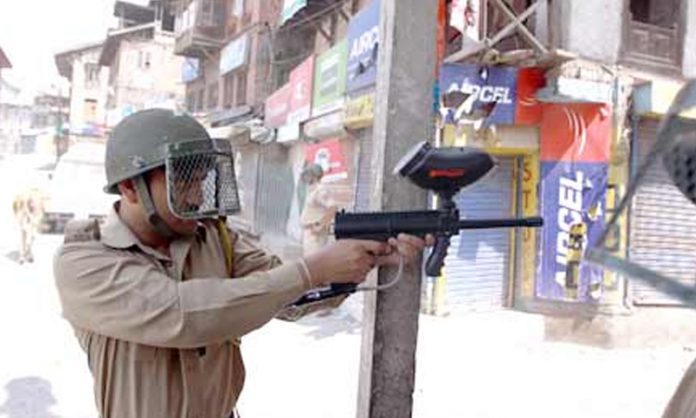In occupied Kashmir, a study conducted by the Department of Psychiatry of Government Medical College (GMC), Srinagar, has revealed that 85 % of pellet victims were diagnosed with a psychiatric disorder.
The study titled ‘Psychiatric Morbidity in Pellet Injury Victims of Kashmir’ said that since the 2016 mass uprising in Kashmir, 325 pellet victims had been treated for psychiatric disorders at associated hospitals of Government Medical College (GMC) Srinagar. “85 % of 380 pellet victims examined during this post-2016 uprising period were found to be suffering from various psychiatric disorders,” it said.
The study found that the majority of the pellet injured (68.4%) had suffered eye injury. Less than half (42.37%) of them had suffered grievous injury in the eyes. 92.92% of the patients with eye injuries were diagnosed with a psychiatric disorder, as compared to 70% patients with other than eye injury.
Of the total number of pellet injured persons, 85% had developed psychiatric disorders and were treated at hospitals. “Depression was the most common psychiatric disorder (25.79%) followed by Adjustment disorder (15.79%). While 9.21% victims had PTSD, hypomania was the least common psychiatric disorder (2.11%),” the data revealed.
The hospital-based cross-sectional research was conducted over a period of two years, involving 380 pellet injury victims from Orthopaedics and Ophthalmology departments of GMC Srinagar. “All patients underwent detailed psychiatric screening based on Mini-International Neuropsychiatric Interview (MINI plus and MINI-kid). Diagnostic and Statistical Manual (DSM-5) was applied to confirm the diagnosis,” it said.
The study said that psychiatric morbidity was found in pellet injured victims proportional to severity and site of the injury.
The study was authored by Dr Saleem Yousuf.
Pellet guns were introduced by the Indian authorities in occupied Kashmir in 2010 to quell anti-India protests. The gun fires a cluster of small, round-shaped pellets with high velocity which do not have a predictable trajectory and can cause severe injuries.





